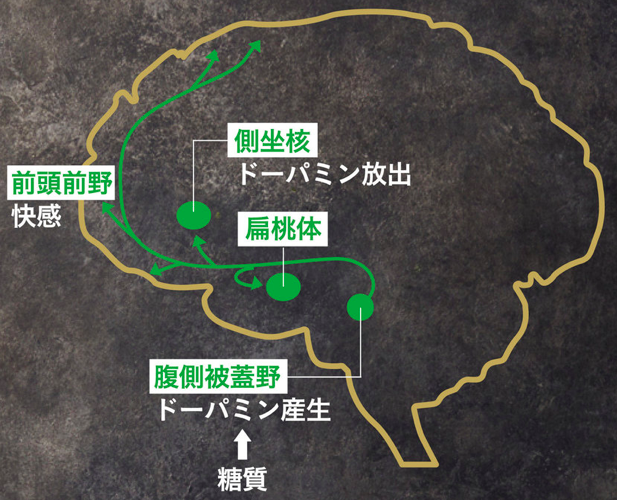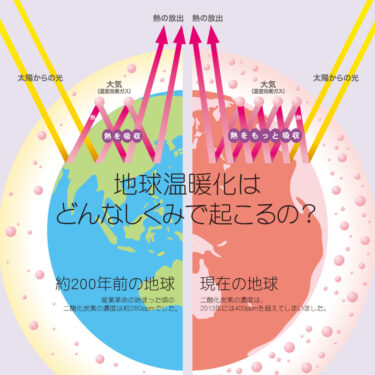はじめに
今回のTED動画は砂糖が脳に与える影響という刺激的なタイトルで決めた。女の子は甘いものが好きだ。自分も疲れた時とかには王将の餃子を食べたくなったり、美味しい魚料理を食べたくなったり、スウィートを食べたくなったりする。甘いものが好きなのは、子供や女の子だけではなくおじさんも好きだったりする。そんなヒトはこの動画を見てほしいと思った。
(出典:YouTube)
砂糖と塩
塩の取り過ぎは健康に悪いとよく言われる。でも、砂糖の取り過ぎの方がヤバイと思う。だって、塩は生命の源であり、塩なしでは生物は生きていけない。また、塩分は汗や涙などの体液で体外に排出する仕組みもある。一方、砂糖は甘いし、美味しいし、食生活には欠かせないものだけど、砂糖に溢れた食生活は近代になってからであり、排出機能もない。下の記事によると砂糖の過剰摂取が高血圧の原因となる。これは説得力がある。
どちらも適量を摂取している分には特に悪いわけではない。でも、強いて言うのであれば、摂り過ぎた場合は砂糖の方が健康全般に悪い影響がある、とヘッド氏。マクモーディー氏もこの意見には賛成しており、「塩は身体を正しく機能させるのに欠かせないが、砂糖はそうではない」と話す。2014年の『Diabetology & Metabolic Syndrome』に掲載された論文でも、砂糖が塩分の身体に与えるマイナス作用を増やす可能性があるとしている。インスリンは腎臓に塩分を保持するように指令を出すが、インスリンの分泌量が増えれば、水分と塩分をもっと身体に溜め込むようになり、これが高血圧になる。砂糖と塩の摂取量をきちんとコントロールするには、全粒穀物、乳製品、フルーツなど栄養のあるものから炭水化物を摂取するようにして、とマクモーディー氏はアドバイスする。そして、精製された砂糖や加工食品は避けるようにすると良いそう(出典:WomanHealth)。
ドーパミン産生と放出
ドーパミン(Dopamine)はやる気の源泉だ。ドーパミンは中枢神経系に存在する神経伝達物質であり、アドレナリンやノルアドレナリンの前駆体だ。運動調節、ホルモン調節、快の感情、意欲、学習などに関わる。ドーパミンは分泌されると、様々な効果を発揮する。例えば、血管ではノルエピネフリン放出を抑制し血管を拡張する。腎臓ではナトリウム排泄と尿量を促進させる。膵臓ではインスリン分泌を促進し、消化器では消化管運動を抑制する。一方、免疫系ではリンパ球の活性を低下させる。このようにドーパミンの分泌はプラスの効果もあるけど、マイナスの側面もある。糖分を摂取するとドーパミンが分泌され、それが脳の扁桃体から側坐核に伝わり、ドーパミンの放出につながり、前頭前野で快感を感じる。なお、側坐核は報酬や快感、恐怖などに重要な役割を果たし、この機能の働きが強い者は嘘をつきやすいという研究もあるという。

(出典:TARZAN)
適度な食生活が一番
砂糖はキャンディーやデザートだけでなく、トマトソース、ヨーグルト、ドライフルーツ、フレーバーウォーター、グラノーラバーにも加えられている。大事なことは、砂糖が脳に与える影響を理解することだ。人は、様々な食べ物から新しい味や異なる味に注意を払うように進化している。これは、様々な栄養素を摂取したり、新しい食べ物を見つける能力につながっている。その結果、バランスの取れた健康的な食生活をすると、ドーパミンは高まるけど、徐々にレベルが低下する。しかし、砂糖を過剰摂取すると、ドーパミンが低下せず、さらに糖分を摂取したくなる中毒性が発生する。甘いものを食べたいときは、炭水化物を必要とする時だけではなく、ドーパミンを維持するために脳が甘いものを要求するが、砂糖を摂取しても、脳は糖分の摂取をさらに要求し続ける。たまにケーキを食べるぐらいなら問題はないけど、常態的に甘いものを食べ続けることは体内の糖分を高めるという肉体的な問題に加えて、精神的な問題が発生することを理解すべきだ。
8つの質問
Q1) Sugars are ________________ processed foods such as tomato sauce, dried fruit, and granola bars.
糖質は、トマトソース、ドライフルーツ、グラノーラバーなどの加工食品に「____」ですのカッコ内に入る言葉は何かという説もんだ。添加されるなので、「Added to」か。
Q2) Sugar ___________ the brain’s reward system.
砂糖は脳の報酬系をどうするか問う設問だ。活性化なので、「Activates」か。
Q3) Overstimulation of the reward system may result in
報酬系が過剰に刺激されると何が起きるかという設問だ。コントロールの喪失(Loss of control)と渇望(Craving)と耐性の増加(Increased tolerance)の全てなので、「All of the above」か。
Q4) What important chemical in the brain is changed in response to sugar ingestion?
砂糖の摂取に反応して変化する脳内の重要な化学物質は何かという説もんだ。ドーパミン(Dopamine)か。
Q5) What kind of diet has an effect in the brain that is similar to eating a balanced meal?
バランスのよい食事をするのと同じような効果を脳にもたらす食事とはどのようなものかという設問だ。甘いものをたまに食べるなので、「Eating sugary foods once in a while」か。
Q6) Using the information from the video, briefly describe how eating sugar can lead to greater cravings, loss of control, and increased tolerance.
砂糖を食べるとどのように欲求が高まり、コントロールが効かなくなり、耐性が高まるかを簡単に説明しなさいと言う設問だ。砂糖を食べ過ぎると、ドーパミンが反応し続け、報酬を感じ続けることになり、それが中毒の原因となるので、英語では次のような感じか。
Q7) Sugar consumption causes distinct changes to the brain’s reward system. What other stimuli activate this system and what are similar behaviors seen between them and sugar overconsumption?
砂糖の摂取は脳の報酬系に明確な変化をもたらす。このシステムを活性化する他の刺激と、砂糖の過剰摂取との間に見られる類似の行動とは何かと言う設問だ。アルコール、ニコチン、ヘロインなどでも、脳内ドーパミンを活性化させ続ける現象が見られるので、英語だと次のような感じか。
Q8)How does brain signaling differ between chronic sugar overconsumption and a regular balanced meal?
糖分の過剰摂取と通常の食事では、脳内シグナル伝達はどのように違うかと言う設問だ。慢性的な糖分の過剰摂取は、ドーパミンに反応し続けることになる。普通の食事でもドーパミンは反応し続けますが、徐々に減少していくので、英語なら次のような感じか。
まとめ
塩分も糖分も過剰摂取は良くない。大事なことは適度な量の摂取だろう。塩分の取り過ぎは高血圧の原因になると良く言われるけど、実は糖分を取りすぎると、「インスリンの分泌量が増えると、水分と塩分を身体に溜め込むために高血圧になる」と言うのは初耳だったけど納得した。個人的には、塩分は体外に排出する仕組みはあるし、そもそも過剰摂取すると苦味を感じて摂取を抑制する仕組みがあるので、注意すべきは加工食品に使われている精製塩の抑制だ。一方、糖分もあらゆる加工食品で使われているので注意が必要だ。体外に排出する仕組みは、糖尿病になったら尿から排出されるけど、これはもう健康状態とは言えない非常手段なので、普段から節制する必要があるだろうと思った。
以上
最後まで読んで頂きありがとうございました。
拝
参考:英文スクリプト
Picture warm, gooey cookies, crunchy candies, velvety cakes, waffle cones piled high with ice cream. Is your mouth watering? Are you craving dessert? Why? What happens in the brain that makes sugary foods so hard to resist? Sugar is a general term used to describe a class of molecules called carbohydrates, and it’s found in a wide variety of food and drink. Just check the labels on sweet products you buy. Glucose, fructose, sucrose, maltose, lactose, dextrose, and starch are all forms of sugar.
So are high-fructose corn syrup, fruit juice, raw sugar, and honey. And sugar isn’t just in candies and desserts, it’s also added to tomato sauce, yogurt, dried fruit, flavored waters, or granola bars. Since sugar is everywhere, it’s important to understand how it affects the brain. What happens when sugar hits your tongue? And does eating a little bit of sugar make you crave more? You take a bite of cereal. The sugars it contains activate the sweet-taste receptors, part of the taste buds(味蕾) on ht tongue. These receptors send a signal up to the brain stem, and from there, it forks off into many areas of the forebrain, one of which is the cerebral cortex.
Different sections of the cerebral cortex process different tastes: bitter, salty, umami, and, in our case, sweet. From here, the signal activates the brain’s reward system(報酬系). This reward system is a series of electrical and chemical pathways across several different regions of the brain. It’s a complicated network, but it helps answer a single, subconscious question: should I do that again? That warm, fuzzy feeling you get when you taste Grandma’s chocolate cake? That’s your reward system saying, “Mmm, yes!” And it’s not just activated by food. Socializing, sexual behavior, and drugs are just a few examples of things and experiences that also activate the reward system. But over activating this reward system kickstarts a series of unfortunate events: loss of control, craving, and increased tolerance to sugar.
Let’s get back to our bite of cereal. It travels down into your stomach and eventually into your gut. And guess what? There are sugar receptors here, too. They do not taste buds, but they do send. signals telling your brain that you’re full or that your body should produce more insulin to deal with the extra sugar you’re eating. The major currency of our reward system is dopamine, an important chemical or neurotransmitter. There are many dopamine receptors in the forebrain, but they’re not evenly distributed. Certain areas contain dense clusters of receptors, and these dopamine hot spots are a part of our reward system. Drugs like alcohol, nicotine, or heroin send dopamine into overdrive, leading some people to constantly seek that high, in other words, to be addicted.
Sugar also causes dopamine to be released, though not as violently as drugs. And sugar is rare among dopamine-inducing foods. Broccoli, for example, has no effect, which probably explains why it’s so hard to get kids to eat their veggies. Speaking of healthy foods, let’s say you’re hungry and decide to eat a balanced meal. You do, and dopamine levels spike in the reward system hot spots. But if you eat that same dish many days in a row, dopamine levels will spike less and less, eventually leveling out. That’s because when it comes to food, the brain evolved to pay special attention to new or different tastes. Why? Two reasons: first, to detect food that’s gone bad. And second, because the more variety we have in our diet, the more likely we are to get all the nutrients we need. To keep that variety up, we need to be able to recognize a new food, and more importantly, we need to want to keep eating new foods.
And that’s why the dopamine levels off when food becomes boring. Now, back to that meal. What happens if, in place of the healthy, balanced dish, you eat sugar-rich food instead? If you rarely eat sugar or don’t eat much at a time, the effect is similar to that of a balanced meal. But if you eat too much, the dopamine response does not level out. In other words, eating lots of sugar will continue to feel rewarding. In this way, sugar behaves a little bit like a drug. It’s one reason people seem to be hooked on sugary foods. So, think back to all those different kinds of sugar. Each one is unique, but every time any sugar is consumed, it kickstarts a domino effect in the brain that sparks a rewarding feeling. Too much, too often, and things can go into overdrive. So, yes, overconsumption of sugar can have addictive effects on the brain, but a wedge of cake once in a while won’t hurt you.




